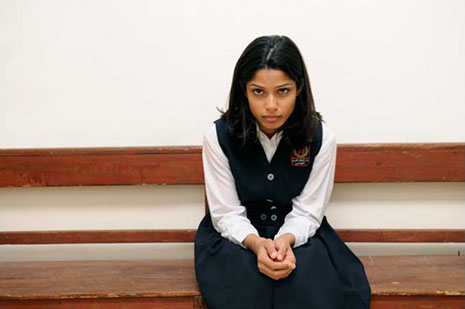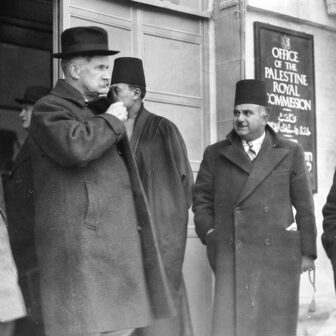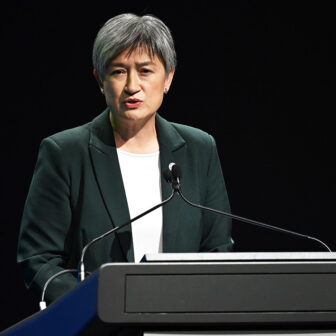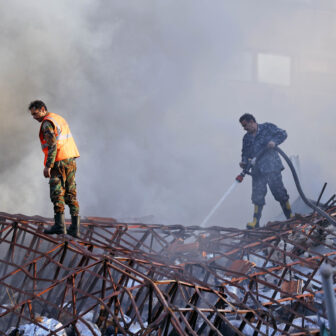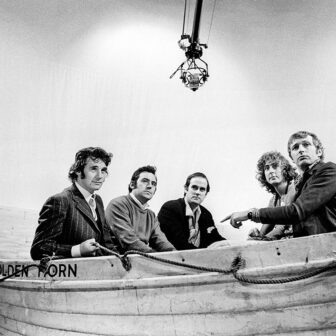IN EACH of its three years so far, the small Palestinian Film Festival has been marked by a spirited, glamorous opening evening: lots of black silk and satin, champagne, high heels and glitter. It’s appropriate; these films come out from under, and without the energies of a very small number of organisers and supporters we’d never know they were there. Celebration is in order. The four evenings of cinema which follow are variously pleasurable and challenging; some films will extend consciousness on what it can mean to live under military occupation, and work to break the stereotypes.
Julian Schnabel’s Miral is, like his earlier, remarkable The Diving Bell and the Butterfly, a full-on melodrama, all stops out; he gets away with it brilliantly. The beautiful, motherless Miral grows up under the tutelage of a true Palestinian heroine, Hind al-Husseini, who keeps her orphanage and school going against all odds. Emerging, on her way to becoming an international journalist, Miral discovers the realities of the refugee camps, and brutalities of the Occupation. This is a film of conventional strategies, deployed for a story that is still outside conventional boundaries; it has great flow and energy, and should be sought for commercial release.
Miral was shown with 138 Pounds in My Pocket, a twenty-minute documentary on Hind al-Husseini and the beginnings of her orphanage, when she took on the child survivors of the Deir Yassin massacre of 1948. The pairing worked well, high-end fiction offered beside its ground in history.
A few films divided the audience. Elia Suleiman’s Divine Intervention moves off from the more literal, autobiographical mode of his The Time that Remains, the major feature in last year’s program, and rebuts empathy to deliver the Occupation as farce. Staring calmly through everything, Suleiman plays a man who lives in Nazareth, with a beautiful young girlfriend in Ramallah. The film opens with the girl, in high heels and a pink sheath, walking imperturbably through a checkpoint, insulting the guards by simply refusing to see them. The tale moves in comic, quasi-surrealist jumps, with more than a touch of the Godards in holding action at a distance and finding absurdity in authoritarian rituals. There’s a wonderful sequence in which a drunken Israeli guard, clumsily trying to control a fast stream of cars at his checkpoint, has to flounder and give up. A red balloon is set flying over the landscape; it carries Yasser Arafat’s face, the expression humorously benign. Some would have liked more realism, but as it is, Divine Intervention helps lift Palestinian cinema up and away from the political ground; the horizon widens, and much more is possible.
Zindeeq is sparse, stern, resolute; as the opening night film, it was found by some to be rather too grave and cheerless. A lone man’s travels through the night, when one hotel after another refuses to find him a bed, are clearly allegorical; where is home? Mohammad Bakri’s intense, contained performance as the searcher instils the sense of dispossession; this is about 1948, and the requirement to remember. Other ways to make that call are spoken, seen and felt in the hour-long essay called As the Poet Said, an elegy in many voices for the late Mahmoud Darwish (1941–2008), modern Palestine’s national poet. It’s been argued that poetry and film can’t work together – remember the discussions round Jane Campion’s Bright Star?; they do here, resoundingly.
One of the strongest items here is Budrus, Julia Bacha’s great documentary already seen, and discussed, after this year’s Sydney Film Festival. Among much else, this film reminds the audience that not all Israelis support the Occupation, and many – particularly among the young – hate and oppose the security wall and all it stands for. Some of those stood with the villagers of Budrus, unarmed, facing the bulldozers that threatened their olive groves and livelihoods; and they won. It’s the strongest pro-peace film I know; beyond argument, they show us how. •
